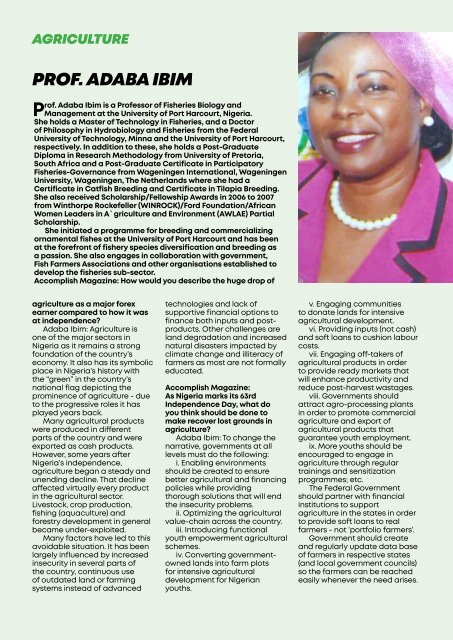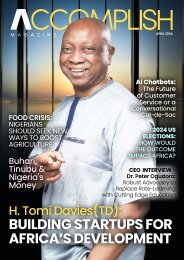ACCOMPLISH MAGAZINE OCT 2023
Aliko Dangote: The Strategist Behind West Africa’s Largest Industrial Conglomerate
Aliko Dangote: The Strategist Behind West Africa’s Largest Industrial Conglomerate
You also want an ePaper? Increase the reach of your titles
YUMPU automatically turns print PDFs into web optimized ePapers that Google loves.
Agriculture<br />
Prof. Adaba Ibim<br />
P<br />
rof. Adaba Ibim is a Professor of Fisheries Biology and<br />
Management at the University of Port Harcourt, Nigeria.<br />
She holds a Master of Technology in Fisheries, and a Doctor<br />
of Philosophy in Hydrobiology and Fisheries from the Federal<br />
University of Technology, Minna and the University of Port Harcourt,<br />
respectively. In addition to these, she holds a Post-Graduate<br />
Diploma in Research Methodology from University of Pretoria,<br />
South Africa and a Post-Graduate Certificate in Participatory<br />
Fisheries-Governance from Wageningen International, Wageningen<br />
University, Wageningen, The Netherlands where she had a<br />
Certificate in Catfish Breeding and Certificate in Tilapia Breeding.<br />
She also received Scholarship/Fellowship Awards in 2006 to 2007<br />
from Winthorpe Rockefeller (WINROCK)/Ford Foundation/African<br />
Women Leaders in A`griculture and Environment (AWLAE) Partial<br />
Scholarship.<br />
She initiated a programme for breeding and commercializing<br />
ornamental fishes at the University of Port Harcourt and has been<br />
at the forefront of fishery species diversification and breeding as<br />
a passion. She also engages in collaboration with government,<br />
Fish Farmers Associations and other organisations established to<br />
develop the fisheries sub-sector.<br />
Accomplish Magazine: How would you describe the huge drop of<br />
agriculture as a major forex<br />
earner compared to how it was<br />
at independence?<br />
Adaba Ibim: Agriculture is<br />
one of the major sectors in<br />
Nigeria as it remains a strong<br />
foundation of the country’s<br />
economy. It also has its symbolic<br />
place in Nigeria’s history with<br />
the “green” in the country’s<br />
national flag depicting the<br />
prominence of agriculture - due<br />
to the progressive roles it has<br />
played years back.<br />
Many agricultural products<br />
were produced in different<br />
parts of the country and were<br />
exported as cash products.<br />
However, some years after<br />
Nigeria’s independence,<br />
agriculture began a steady and<br />
unending decline. That decline<br />
affected virtually every product<br />
in the agricultural sector.<br />
Livestock, crop production,<br />
fishing (aquaculture) and<br />
forestry development in general<br />
became under-exploited.<br />
Many factors have led to this<br />
avoidable situation. It has been<br />
largely influenced by increased<br />
insecurity in several parts of<br />
the country, continuous use<br />
of outdated land or farming<br />
systems instead of advanced<br />
technologies and lack of<br />
supportive financial options to<br />
finance both inputs and postproducts.<br />
Other challenges are<br />
land degradation and increased<br />
natural disasters impacted by<br />
climate change and illiteracy of<br />
farmers as most are not formally<br />
educated.<br />
Accomplish Magazine:<br />
As Nigeria marks its 63rd<br />
Independence Day, what do<br />
you think should be done to<br />
make recover lost grounds in<br />
agriculture?<br />
Adaba Ibim: To change the<br />
narrative, governments at all<br />
levels must do the following:<br />
i. Enabling environments<br />
should be created to ensure<br />
better agricultural and financing<br />
policies while providing<br />
thorough solutions that will end<br />
the insecurity problems.<br />
ii. Optimizing the agricultural<br />
value-chain across the country.<br />
iii. Introducing functional<br />
youth empowerment agricultural<br />
schemes.<br />
iv. Converting governmentowned<br />
lands into farm plots<br />
for intensive agricultural<br />
development for Nigerian<br />
youths.<br />
v. Engaging communities<br />
to donate lands for intensive<br />
agricultural development.<br />
vi. Providing inputs (not cash)<br />
and soft loans to cushion labour<br />
costs.<br />
vii. Engaging off-takers of<br />
agricultural products in order<br />
to provide ready markets that<br />
will enhance productivity and<br />
reduce post-harvest wastages.<br />
viii. Governments should<br />
attract agro-processing plants<br />
in order to promote commercial<br />
agriculture and export of<br />
agricultural products that<br />
guarantee youth employment.<br />
ix. More youths should be<br />
encouraged to engage in<br />
agriculture through regular<br />
trainings and sensitization<br />
programmes; etc.<br />
The Federal Government<br />
should partner with financial<br />
institutions to support<br />
agriculture in the states in order<br />
to provide soft loans to real<br />
farmers - not ‘portfolio farmers’.<br />
Government should create<br />
and regularly update data base<br />
of farmers in respective states<br />
(and local government councils)<br />
so the farmers can be reached<br />
easily whenever the need arises.<br />
8<br />
Accomplish Magazine

















